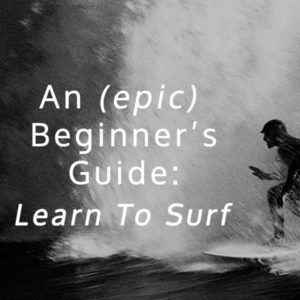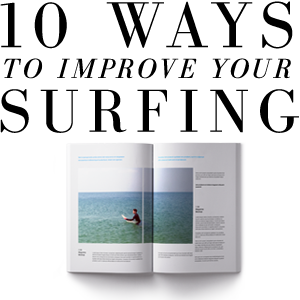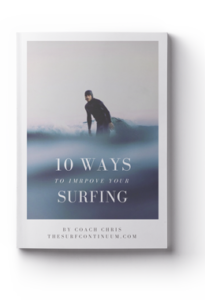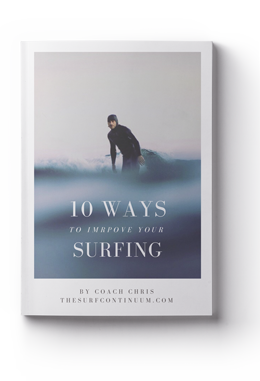

It shouldn’t come as a surprise that one of the best ways to build confidence in anything is to continue pushing yourself to do that very thing. For timid surfers that means water time.
Every small or flat day should be seen as an opportunity to get out there paddling, working on fundamental skills and building yourself up in the least intimidating conditions whenever they are available.
That being said, we came up with a more specific list of ways you can build your confidence as a surfer.
1. Fundamental Proficiency
It’s rare you’ll ask us a question and part of our answer won’t have to do with fluency and expertise in executing your fundamental skill set.
Particularly your paddling technique.
It’s the simplest and most overlooked characteristic of a surfer, but we would argue one of the most important.
It’s true that surfing in essence is about riding waves. But hopefully you progress far enough into surfing to realize that your paddling technique is one of the biggest factors in determining how many waves you ride.
Let’s also not forget the importance of good board control. When you lack the ability to maintain control of your board through the impact zone especially, but at all times anyway is a good reason to be timid about surfing.
There’s an empowering and uplifting effect that occurs in you when you know the skills and techniques surfers use to keep their board under control.
You should learn these things and build your confidence in the absolute smallest of waves first, and progressively allow yourself to practice in stronger surf as your ability allows.
A list on gaining confidence in surfing must start with this. Surfing fundamentals.
2. Wave Obsession
In our experience, knowing the ocean and it’s waves can be so unpredictable is a major source of timidness and fear in beginner surfers.
Therefore, our answer to that fear is to obsess over familiarizing yourself with waves.
Of course this isn’t a solution that eliminates your fear in a day. Working towards familiarity with the ocean, especially your home break, is a daily investment you can make into your confidence every time you’re at the beach whether surfing or not.
Make sure you’re eyes focus on the waves themselves and not the surfers riding them. Take note of how the wave develops as it comes in from the ocean and hits the shallow areas of the reef, or sandbar.
Can you spot any patterns? Is the 6 inch shore pound more detrimental than the 2-3 foot mushy peelers out the back? Does the wave closeout at a certain point down the line every time? Do the peaks shift and break all over the line up, or is there a consistent starting point to most waves? Does the lip fold over and crumble down the face of the wave as it breaks, or is it hurling through the air and impacting with the trough?
The more familiar you get with the ocean and how waves are developing and breaking, the more confident you will become in negotiating them while you surf.
This obsession should become ingrained in you. Your eye will start to randomly catch waves in the background of a beach scene of a Hollywood movie, you’ll see waves in the trees that bend over the sidewalk as you take a stroll around the neighborhood and pretend to get barreled as you pass through.
Last of all in regards to your new found wave obsession is to obsess over waves before you see them.
Use the surf forecast and tools like your local buoy to develop a relationship with what the surf looks like when the buoy reads a certain set of characteristics. Teach yourself to develop opinions on how your local break will look given a certain interval of swell or direction.
The more you know the ocean, the more you feel like she’s your friend and not some loose cannon that can fire on you at any moment.
3. Ditch Your Surf Instructor!
If you’re the type who’s been learning to surf exclusively with a surf instructor or coach…ditch em’!
The first step out on your own is the hardest one, but as soon as you’re on your own you’ll be emboldened by your independence.
Surfing is way too long of a journey to always expect to have someone by your side, especially an expert that calls all the shots.
Give yourself the opportunity to make your own decisions and mistakes and learn on your own.
A nice transition away from a coach is to find a friend to surf with instead.
Make deductions about the surf together. Point out your observations and listen to theirs. It’s this kind of teamwork with a peer that will continue to help you cultivate a sense of pride and courage in your ability.
Certainly the right time to apply this strategy is on a day when the surf is well within your ability and the surf spot is familiar. Don’t let this strategy become counter productive by attempting to paddle out on a scary day at a new spot alone.
4. Surf Alone
Extending the last point one more notch is to get to a point where you surf on your own. No instructor, no friend, no crowd, just you.
Something we wish for every beginner surfer to discover is that next level connection with Mother Nature when it all comes together.
Just like in the previous point, be wise and level up slowly. Choose days that are friendly and within your limits so you can really tap into the experience of becoming part of nature.




